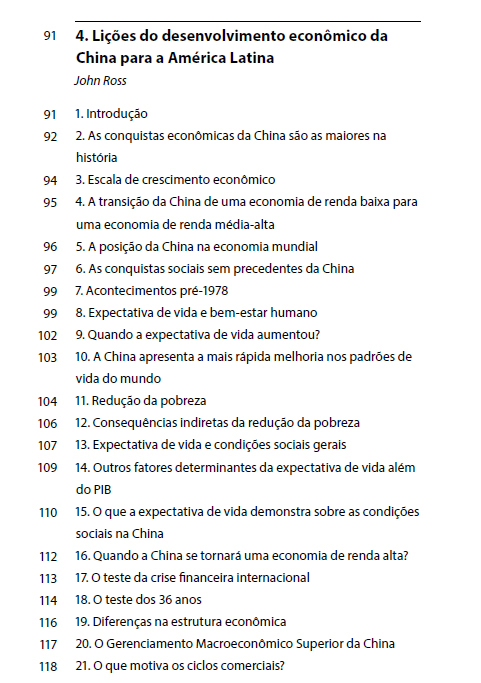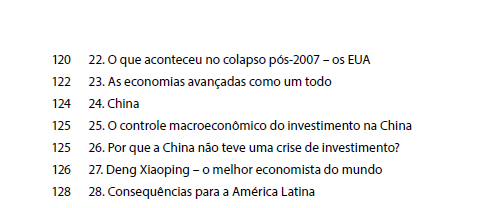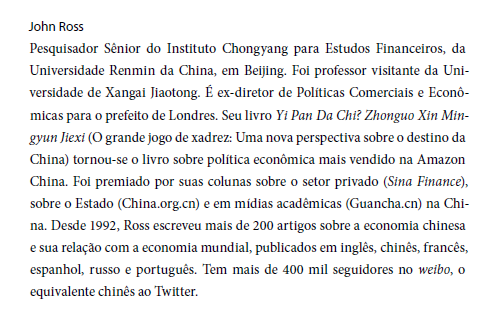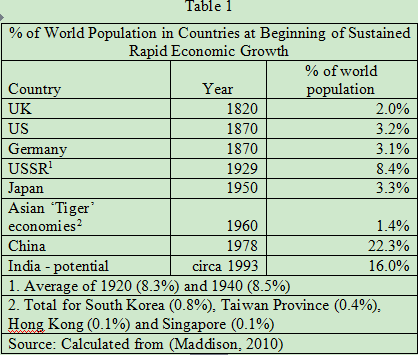Commentaries
Your Present Location: Teacher_Home> John Ross> CommentariesJohn Ross: Lessons of China`s Economic Development for Latin America
Editor`s Notes:
John Ross is a senior fellow at Chongyang Institute for Financial Studies of Renmin University of China. He has been diving into the study of Chinese economy for more than 30 years and has published a large number of articles on Chinese economy and world economy. His new book "Big Chess" attracts global attention and some of the chapters have been translated into several languages to publicize in different countries. The chapter "Lessons of China`s Economic Development for Latin America" has been published in Portuguese in Brazil.




screenshots of the cover, contents, and author brief introduction in Portuguese.
The following is the English version of the chapter:
Lessons of China`s economic development for Latin America
Summary
The economic achievement of the People’s Republic of China is by far the greatest in human history. This is true whether measured in simple economic growth or more importantly in improvement in average living standards or poverty alleviation. This statement is objective, without exaggeration, and is justified in detail in what follows. Yet a wide misconception exists in the West that these unparalleled economic and social achievements are due to capitalism and not to a socialist economic system in China. Such a wrong position has profoundly misleading implications for the economic strategy of the international left including in Latin America. If it is wrongly believed that China’s unparalleled economic and social achievements are due to a capitalist economic system then left wing and socialist forces will not pay the necessary attention to and draw the appropriate lessons from these and the ‘China model.’ This will have seriously negative consequences for the left’s strategy in Latin America and elsewhere. Furthermore, the erroneous conception that China’s is a capitalist economic system allows the right to totally unjustifiably claim credit for China historically unprecedented economic and social success. This chapter consequently establishes four interrelated points:
(i) that China’s economic and social achievements are unparalleled in human history;
(ii) that these economic and social achievements were created by a socialist and not a capitalist economic system;
(iii) that the features of this socialist system are not unique to China;
(iv) therefore, it is a top priority for the left in Latin America, and indeed internationally, to study the lessons of China’s economic success.
The overall aim is to analyse the reasons for China’s economic success and to draw conclusions which are applicable internationally including in Latin America. This naturally does not suggest that the ‘China model’ can be mechanically applied elsewhere, but that the fundamental economic forces underlying it correspond to general economic processes – only their specific combination in China is unique. This is in line with Deng Xiaoping’s repeated insistence, which characterises China’s economic thinking, that China’s economic policy bases itself simultaneously on China’s specific national situation, its ‘Chinese characteristics’, and that: ‘We have tried to act in accordance with objective economic laws.This insistence that China acted simultaneously in accord with its specific conditions and universal laws was continuously asserted by Deng Xiaoping in numerous different contexts. For example:‘Our principle is that we should integrate Marxism with Chinese practice and blaze a path of our own. That is what we call building socialism with Chinese characteristics. The data in this chapter is based on my book published in Chinese ‘The Great Chess Game’ – which is a comparison of the economic development and strategies of China and the US and the geopolitical consequences which flow from this.
China’s economic achievement is the greatest in human history
The first issue is to set out in a measurable and objective way why China constitutes the greatest economic and social achievement in human history. To be precise, and without exaggeration, never before have the conditions of anything approaching so many people, or such a large proportion of the world’s population, been improved so rapidly. As will be shown in detail, even growth in the US, the previous economically dominant state, or in the USSR, was on a qualitatively smaller scale than China.
The simplest and clearest gauge of the historically unparalleled scale of China’s economic achievement is the number of people directly benefitting from it as they lived within China’s borders – this being measured not only in absolute numbers but as a proportion of the world’s population. Table 1 therefore shows the percentage of global population in the world’s largest economies at the time they commenced rapid sustained growth.

Analysing these historical examples:
· The first country to experience sustained rapid economic growth was the UK in the Industrial Revolution with 2.0% of the world’s population.
· Sustained rapid US economic growth, after its Civil War, was in a country with 3.2% of the world’s population.
· When Soviet rapid industrialisation began at the end of the 1920s the USSR contained 8.4% of the world’s population.
· Japan’s rapid post-World War II growth was in a country with 3.3% of the world’s people.
· The growth of the four ‘Asian Tigers’ (Hong Kong, Singapore, South Korea, and Taiwan Province) was in economies which together only comprised 1.4% of the world’s population.
Additional countries might be included – for example Italy from 1950 (1.9% of the world’s population) or Spain from 1960 (1.0% of the world’s population) but introducing these makes no significant difference. No other economy commencing sustained rapid economic growth approaches the 22% of the world’s population in China in 1978 at the beginning of its economic reform. China, at the time of economic ‘lift-off’, was seven times the relative percentage of the world population of the US or Japan, and almost three times that of the USSR.
Key Words: China; economy; Latin America; John Ross























































































 京公网安备 11010802037854号
京公网安备 11010802037854号





